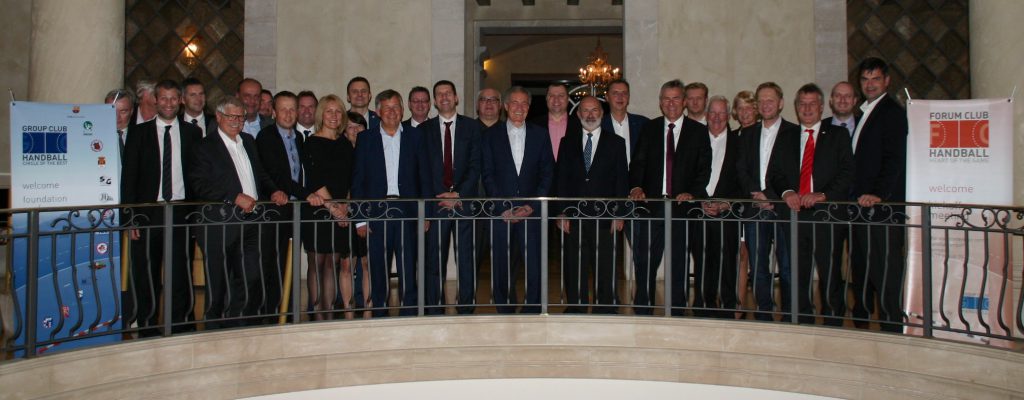A number of leading European Clubs, including Barcelona, Kiel, Kielce and Veszprem, pooled their TV and Marketing Rights for international Club Handball as of season 18/19 on occasion of the VELUX EHF CHAMPIONSLEAGUE draw. Related documents were signed in Ljubljana last Friday.
The European Top Clubs expressed the wish of a cooperation between clubs, EHF and International Management Group (IMG) in the future.
Earlier this year EHF announced on the fringes of the VELUX CL Final4 that it is intended to launch a call for a tender for the Champions League rights as of 2020. At the same time the clubs regard themselves to be the owner of their TV and Marketing Rights, once the current MoU expires on 30th June 2018.
In order to prepare European Club Handball for the future, FCH and EHF will shortly start negotiations on a new ‘Memorandum of Understanding’ (MoU) for the next term, commencing on 1st July 2018.
The 17th General Assembly of Forum Club Handball took place on the fringes of the EHF VELUX FINAL4 in Cologne on 4th June. For the first time ever IHF-President Hassan Moustafa attended the club meeting.
He and EHF-President Michael Wiederer took the chance to inform on the latest developments in IHF and EHF.
Moustafa thanked for the invitation and declared that he is always ready to listen to the clubs as the main actors in handball. He made the proposal to add the clubs as stakeholders to the IHF statutes. The proposal was very much appreciated by the participants. According steps will be taken.
Wiederer used the chance to report on the contractual situation in EHF and EHFM. All important contracts expire in 2020. EHF/M is in the process of preparing a tender for the rights (EHF EUROs and Champions League) for the period 2020 onwards. The CL rights shall be sold for a 10-year-period 2020 until 2030. Prior to that decision the MoU between FCH and EHF/M must be negotiated/prolonged accordingly.
The FCH representatives in the various EHF/M bodies reported on their activities in detail.
A group 10 European Top Clubs (Barcelona, Celje, Flensburg, Kiel, Kielce, Kolding-Copenhagen, Montpellier, Schaffhausen, Vardar, Veszprem) presented a concept for a new Champions League system as of season 18/19. Therefore these clubs intend to set up Joint-Venture with International Management Group (IMG). The concept which has been presented to EHF/M in various meetings, foresees that EHF will be the regulatory body, being in charge of refereeing and other important parts. It is the target to establish a real European League with 12 or 14 or 16 teams and a Round-Robin system, followed by Quarterfinals and Final4. Further details and financials were explained to the participants. According to the concept IMG will provide financial guarantees for the next 10 years. The vision is to have a premium product to be presented to the handball fans throughout the whole year.
The assembly discussed the proposal.
The following decisions were taken unanimously:
The next ordinary General Assembly will take place in Zagreb on 26th/27th January 2018. GB
IHF-President Hassan Moustafa met with the FCH Presidents Xavier O’Callaghan/FC Barcelona (Men) and Zsolt Akos Jeney/Ferencvaros Budapest (Women) in autumn 2016.
During the meeting the parties agreed to sign an agreement about future cooperation. In the meantime a first draft was produced by the Managing Directors of IHF and FCH. The result will be presented to the General Assemblies of FCH in Budapest (May) and Cologne (June). If the club representatives confirm the content of the agreement, the signing could take place during the next IHF Congress in November 2017.

The 10th anniversary of FCH was celebrated on the fringes of the ordinary board meetings of the Men’s and the Women’s Forum Club Handball in Spain on 6th November 2016.
FCH President Xavier O’Callaghan welcomed the guests, among them from the International Handball Federation President Dr. Hassan Moustafa, from the European Handball Federation President Jean Brihault and Secretary General Michael Wiederer, from the European Professional Handball Leagues Association President Frank Bohmann, from Euroleague Basketball Elisendra Salrach, from Women’s FCH President Zsolt Akos Jeney and the former FCH Presidents Tomaz Jersic and Joan Marin.
During a reception the guests were interviewed and described their relation to Forum Club Handball. In the following dinner Xavier O’Callaghan highlighted the situation in 2006 which lead to the foundation of the FCH predecessor Group Club Handball. Jean Brihault emphasized the unity of the handball family: There is no ‘you’ and ‘we’, there is only an ‘us’. Hassan Moustafa stressed in his speech the importance of the clubs for the handball system and showed his willingness to communicate with the clubs on a regular basis.
In 2006 Group/Forum Club Handball was founded by 14 European Top Clubs. The 10th anniversary will be celebrated during the Board meeting in Spain on 6th November 2016.
Among others, the President of the International Handball Federation (IHF) Dr. Hassan Moustafa, the President of the European Handball Federation (EHF) Jean Brihault, the Secretary General of the EHF Michael Wiederer, the President of the European Professional Handball Leagues Association (EPHLA) Frank Bohmann and the President of the European Professional Handball Players Union (EHPU) Marcus Romminger confirmed their participation.

The 15th General Assembly of Forum Club Handball took place on the fringes of this years VELUX FINAL4 in Cologne. 35 clubs from 21 countries were present, among them the 4 VELUX FINAL4 participants from Kielce, Veszprem, Paris and Kiel, but also Athens, Celje, Dublin, Flensburg, Granollers, Hasselt, Kristianstad, London, Minsk, Skopje, Zaparozhe and Zagreb to mention some of them.
As the current FCH-President, Joan Marin, took over the position of the Managing Director in Spanish ASOBAL, he did not stand for re-election.
The newly elected FCH-Board reads as follows:
President: Xavier O’Callaghan (FC Barcelona/ESP)
Vice-President + Treasurer: Dierk Schmäschke (Flensburg/GER)
Vice-President: Bert Servaas (Kielce/POL)
Board member: Peter Leutwyler (Schaffhausen/SUI)
Board member: Karl Lofmark (Lund/SWE)
Deputy Board members:
Thorsten Storm (Kiel/GER)
Pep Blanchart (Granollers/ESP)
Robert Molines (Montpellier/FRA)
Gregor Planteu (Celje/SLO)
Magnus Clarke (Dublin/IRL)
FCH representatives:
EHF Competition Commission: Radek Wasiak (Kielce/POL)
EHF Professional Handball Board:
Xavier O’Callaghan (FCH President)
Gerd Butzeck (FCH Managing Director)
EHF Club Licensing Working Group
Joan Marin (FCH Honorary member)
EHFM Men’s Club Board:
Thorsten Storm (FCH Dep Board member)
Lasse Boesen (Kolding-Copenhagen/DEN)
EHFM Advisory Board
Gerd Butzeck (FCH Managing Director)
EHFM Financial Inspection
Peter Leutwyler (FCH Board member)
FCH Comptroller
Gerd Hofele (Göppingen/GER)
The meeting minutes will be delivered to the FCH Member clubs in June 2016. GB
The upcoming 15th General Assembly will see elections for the FCH Board and offices. Candidates for the FCH Board have to be nominated 2 weeks prior to the meeting at the latest.
Candidates were nominated from the FCH member clubs as follows:
1. Election of the FCH Board member Nation ranked 1 GER
Candidate: Dierk Schmäschke/Flensburg
2. Election of the FCH Deputy Board member Nation ranked 1
Candidate: Thorsten Storm/Kiel
3. Election of the FCH Board member Nation ranked 2 ESP
Candidate: Xavi O’Callaghan/FC Barcelona
4. Election of the FCH Deputy Board member Nation ranked 2
Candidate: Pep Blanchard/Granollers
5. Election of the FCH Board member Nation ranked 3-6
(HUN, FRA, DEN, POL)
Candidate: DEN Jens Boesen/Kolding-Copenhagen
Candidate: POL Bertus Servaas/Kielce
6. Election of the FCH Deputy Board member Nation ranked 3-6
Candidate: FRA Robert Molines/Montpelier
7. Election of the FCH Board member Nation ranked 7-12
(SLO, MKD, ROU, SWE, CRO, RUS)
Candidate: SLO Gregor Planteu/Celje
Candidate: SWE Karl Lofmark/Lund
Candidate: SWE Nikolas Larsson/Kristianstad
8. Election of the FCH Dep Board member Nation ranked 7-12
9. Election of the FCH Board member Nation ranked 13-49
(POR, BLR, SUI, UKR, NOR, SRB, SVK, TUR, LUX, …)
Candidate: Peter Leutwyler (SUI)
Candidate: Magnus Clarke (IRL)
10. Election of the FCH Dep Board member Nation ranked 13-49
Candidate: Radu Miclaus (ENG)
Candidate: Nemanja Protic (SRB)
A candidate, being NOT elected as Board member, will become candidate Deputy Board member.
Gerd Butzeck/Election Supervisor
During the 5th General Assembly of Women Forum Club Handball the ordinary elections took place. As the outgoing President Ernö Kelecsenyi left his club Györi Audi ETO KC two months ago, he did not stand for re-election. The General Assembly expressed its thanks to Ernö Kelecsenyi who set up the structure of the Organisation.
The following persons were elected:
Board Member Nation ranked 1 (DEN): Thomas Hylle/Team Esbjerg/unanimous
Deputy Board Member Nation ranked 1 (DEN): Lars Gantzel/FC Midtjylland/unanimous
Board Member Nation ranked 2 (HUN): Zsolt Akos Jeney/Ferencvaros Budapest/unanimous
Deputy Board Member Nation ranked 2 (HUN): Lazlo Radványi/unanimous
2 Board Members Nations ranked 3-8 (RUS, NOR, GER, FRA, ROU, MNE):
Kay-Sven Hähner/HC Leipzig – GER
Per Christian Andersen/Larvik HK – NOR
2 Deputy Board members Nations ranked 3-8 (RUS, NOR, GER, FRA, ROU, MNE):
Stanislav Kulinchenko/HC Kuban – RUS
Bojana Popovic/ZRK Buducnost – MNE
Election Board Member Nations ranked 9-50 (AUT, MKD, SWE, SLO, CRO, ESP, …):
Gordana Naceva/Vardar Skopje – MKD
Election Deputy Board Member Nations ranked 9-50 (AUT, MKD, SWE, SLO, CRO, …):
Deja Ivanovic/RK Krim Mercator – SLO
The newly elected Board proposed candidates for the various WFCH offices as follows:
WFCH President: Zsolt Akos Jeney – Ferencvaros Budapest/HUN
2 WFCH Vice-Presidents: Kay-Sven Hähner/GER and Gordana Naceva/MKD
WFCH-Treasurer and EHFM finances inspection: Kay-Sven Hähner/GER
WFCH Comptroller: Jutta Ehrmann/GER
WHB-representative: Deja Invanovic/SLO
WCB-representatives:
Gordana Naceva/MKD, Kay-Sven Hähner/GER, Zsolt Akos Jeney/HUN, Thomas Hylle/DEN, Per Christian Andersen/NOR
All nominations were approved unanimously. GB
During the common board Meeting in Spain, the presidents of Men’s Forum Club Handball Joan Marin and Women’s Forum Club Handball Ernö Kelecsenyi prolonged the cooperation of the two organisations until June 2018.